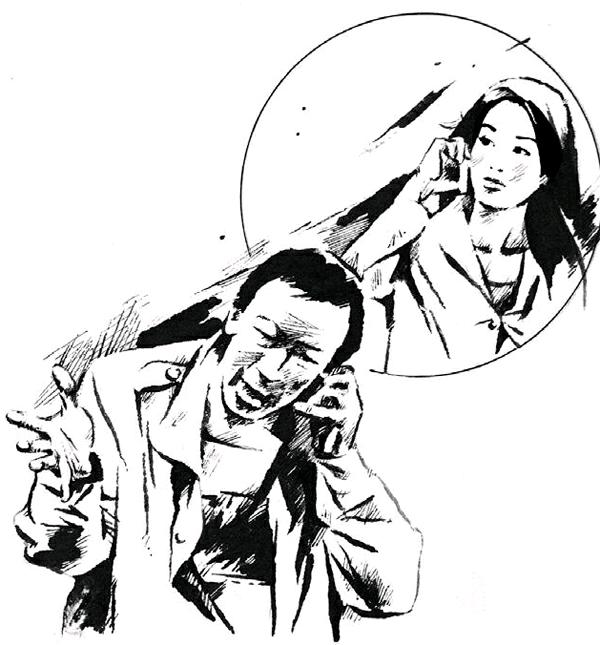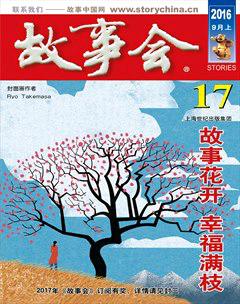另類“潛伏”
石長文
撿個大活人
市醫院收治了一個重癥患者,七十多歲了,姓梁。入院第二天,老人從昏迷中醒過來,拒絕治療,伸手把針管子拔了。看他那神情,就是絕望了,不想活了!
住在同一病房的,還有一個姓劉的患者,他的兒子劉若舟在新聞單位工作,是一位資深記者。這天,劉若舟正好來看望老父親,陪著父親,一起看正在熱播的電視劇《潛伏》。這邊在看電視,那邊梁老爺子正和陪護他的老伴在嗚嗚地哭,于是劉若舟就把電視機調低了聲音,關切地上前去詢問。一開始,這兩個老人什么都不說,后來見劉若舟掏出了記者證,說有什么困難一定會幫助解決,兩個老人這才把一件壓在心底的事情說了出來。
原來,梁老爺子是個退休工人,沒有子女。十多年前,老人在報紙上看到有捐資助學的事兒,就和老伴商量好了,千挑萬選,選了一個家庭貧困的小男孩作為資助對象。這個小孩叫馬必達,那時還在念小學四年級。梁老爺子的老伴沒有工作,他自己的退休金每月還不足千元,為了供這個小孩上學,老兩口省吃儉用,每月省出150元錢寄給他。后來馬必達上了中學,助學款加到每月250元。再后來上了大學,這筆錢又增加到每月400元。
兩年前,馬必達大學畢了業,信誓旦旦地說要找工作掙錢,報答老人家這份恩情。可讓人想不明白的是,過了沒幾個月,這個馬必達忽然就人間蒸發了,電話打了一遍又一遍,就是聯系不上。
劉若舟聽完了,知道了老兩口是為這事極度失望,馬上對梁老爺子說:“這件事我來辦吧,我社會上的朋友很多,就是挖地三尺,也要找到這個馬必達。”
就這樣,劉若舟拿著老人給他的一個舊電話號碼,先找到了通信公司,說明了具體情況,拿到一份馬必達在兩年之前的手機賬單。劉若舟找出其中一個與機主通話頻繁的號碼打了過去,還真不錯,電話一下就接通了,說話的是個年輕女人。劉若舟自稱是馬必達的中學同學,問怎么樣才能聯系上馬必達。
電話里,那個女人沉默了半天,對他說了三個字:“他死了!”
馬必達真的是死了嗎?要真是這樣,那倒是好解釋他為什么會突然失去了聯系,可是一回味,劉若舟覺得這個女人的情緒有些怪怪的。于是,劉若舟再次把電話打過去,他先交代了自己的記者身份,又把事情原原本本地講了一遍。對方聽了很感動,告訴他,自己曾經是馬必達的女朋友,但很久以前就分手了,因為這個馬必達發財心切,剛剛畢業就開了一家公司,因為沒賺到錢,就搞起了歪門邪道,被法院以詐騙罪判了8年有期徒刑。
知道了馬必達的下落,劉若舟很快趕到了他服刑的監獄。兩人見了面,劉若舟說了梁老爺子的情況,馬必達聽后失聲痛哭,一年前,自己犯了罪,被公安機關抓獲,想了又想,沒敢把這個消息告訴老人家,無顏面對啊!老人家辛辛苦苦幫助自己上學,如今自己卻身陷囹圄,讓老人家情何以堪啊!
怎么辦?劉若舟為難了。如果讓馬必達以囚犯的身份和梁老爺子見面,這是絕對不行的,老人家那份脆弱的感情無法承受這樣殘酷的現實,可要是說找了一大圈,沒有尋找到馬必達,同樣會加深老人家的傷感,他會以為自己養活了一個忘恩負義的白眼狼。這也不行,那也不行,到底該怎么辦呢?
晚上回到家里,劉若舟左思右想,仍是一籌莫展。家里人在客廳看電視,播的是連續劇《潛伏》,劉若舟想了想,忽然有了一個好主意。
第二天,劉若舟買了一束鮮花,來到梁老爺子的病床前,告訴他:“我幫您把馬必達找到了,這束鮮花就是他買的,讓我帶給您,祝您老早日康復!”梁老爺子一陣驚喜,問:“小馬這孩子在哪呢?他怎么不來看看我?”
劉若舟湊到老人身邊,故作神秘地對他說:“老人家,我要是把事情的真相告訴您,您可一定要保守秘密啊!”梁老爺子說:“怎么了?小馬快兩年沒來見我了,他是有什么秘密嗎?”
劉若舟說:“是啊,因為有紀律要求,他不能把自己的行蹤告訴任何人,我動用了好多關系才打聽到了他的消息。老人家,我先問您,您知道什么叫臥底嗎?”
梁老爺子愣了一下,說:“知道啊,就是把自己裝成壞蛋,再混到壞人堆里,最后把壞人一網打盡了,電視里總這么演的。”
劉若舟說:“對了,老人家,您真了不起啊,這十幾年的心血沒有白費,您培養出了一個優秀的人才。現在的小馬,就是給咱們公安機關當臥底呢,上級派他裝扮成犯罪分子,到監獄里邊去‘服刑,準備在出獄之后,打進一個國際犯罪團伙。就因為接了這個艱巨的任務,他中斷了和外界所有的聯系。不過,我請示了他的領導,講了您老人家資助他讀書的事兒,領導同意他通過手機和您說幾句話。”
因為事先和監獄的管理人員約好了,劉若舟把電話一撥,馬必達就出現在手機的屏幕上,他身穿囚服,眼含熱淚。一老一少,以這樣的方式相見,要說的話實在是太多了,可是想不到的是,梁老爺子和馬必達剛剛說了幾句話,忽然不說了,他把手機塞到劉若舟手里,小心翼翼地說:“孩子,我不能和他多說了,你也快把這個手機號刪掉吧。小馬給國家干著大事兒呢,千萬千萬不能讓他暴露身份啊!”
電話那頭的馬必達,看到梁老爺子老態龍鐘的樣子,想到老人家這十多年來對自己的付出,心如刀絞,又悔又恨,禁不住失聲痛哭……

